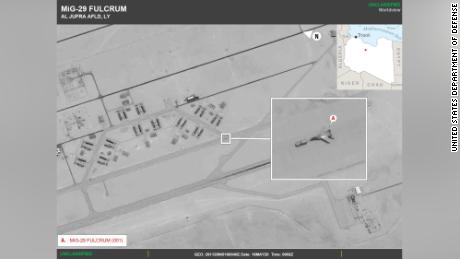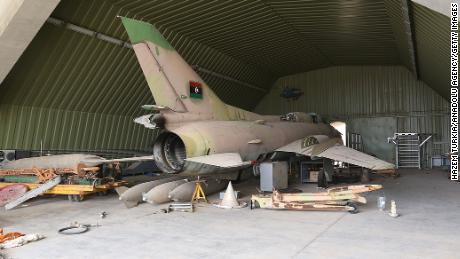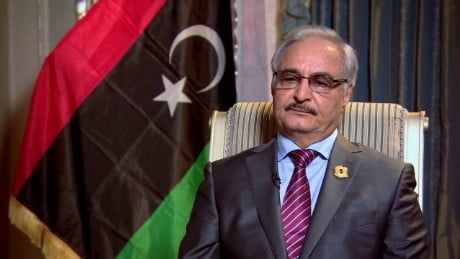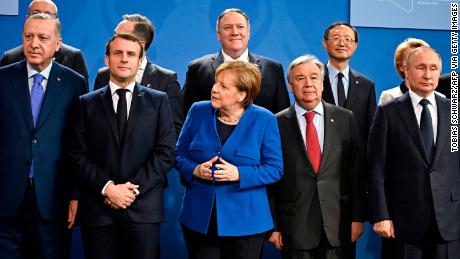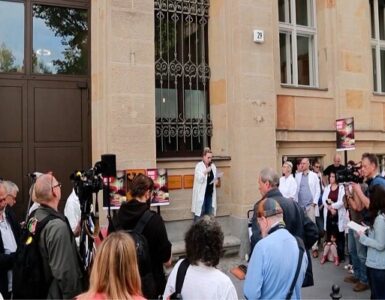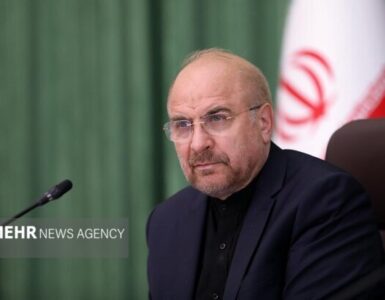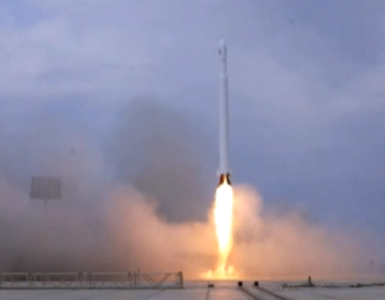“Our rocket did that … this is their plane,” the Libyan fighter yells.
He was standing in what remained of the strategically important al Watiya airbase, near the Tunisian border. Militia affiliated with the UN-recognized government had just overrun the base; forces loyal to renegade general Khalifa Haftar had fled.
Among Haftar’s retreating fighters were dozens of Russian mercenaries hauling their Pantsir air defense systems with them. They are part of a larger force of some 2,000 Russians belonging to the private Russian military contractor Wagner, which has been in Libya since 2018.
The loss of al Watiya, on May 18, has been swiftly followed by further reverses for Haftar’s forces, which last week retreated from Tripoli airport and the city of Tarhouna, their last toehold in western Libya.
This sudden shift of fortunes is more than another episode in Libya’s intractable conflict.
It has less to do with the Libyans themselves than with outside powers pouring weapons, fighters and money into the country. The government is backed by Turkey and Qatar; Haftar by the United Arab Emirates, Egypt and Russia.
But Russia — far from abandoning Haftar — is doubling down. As the bedraggled convoy withdrew from the desolate airbase, the Kremlin had a surprise in store. Within a couple of days, Russian combat aircraft arrived in eastern Libya, glinting silver at two remote desert airfields.
US Africa Command (AFRICOM) said the jets — a total of 14 MiG-29s and Su-24s — had flown from Russia via Iran and Syria. While in Syria they’d been stripped of their markings. AFRICOM said the aircraft were “likely to provide close air support and offensive fires” for the Wagner fighters.
Most appear to be at the al Jufra base deep in the central Libyan desert; satellite imagery suggests an extensive support operation, including surface-to-air missiles.
President Vladimir Putin now has access to two air bases in Libya, strengthening the growing Russian presence around the Mediterranean — and setting off alarm bells in Washington, which wants all foreign actors out of Libya
The commander of AFRICOM, Gen. Stephen Townsend, said of the Russian move: “Just like I saw them doing in Syria, they are expanding their military footprint in Africa using government-supported mercenary groups.”
The Kremlin hasn’t commented but the head of the defense committee in the upper house of the Russian parliament. Viktor Bondarev, said AFRICOM’s claim was “stupidity” and suggested they were old Soviet planes from somewhere else in Africa.
Beyond the Libyan context, AFRICOM told CNN: “If Russia is allowed to effectively shape the ultimate result of the Libya conflict, the US, and especially NATO and Europe, will not like the outcome.”
Tobias Borck, Associate Fellow at the Royal United Services Institute in London, said that “for there to be a Russian airbase in the southern Mediterranean — that is the soft underbelly of NATO — is a strategic concern.”
A senior western diplomat said he had been surprised by Moscow’s move. “That the Russian intervention went from mercenaries on the ground to jet fighters is really quite brazen and astonishing,” the diplomat told CNN.
Since the end of Moammar Gadhafi’s rule in 2011, Libya has been a maelstrom. Tribes, warlords, radical Islamists and more have jostled for power, and control of its oil wealth.
Haftar promoted himself as the man who could unite Libya and rid it of extremists. He had dreams of taking Tripoli and becoming Libya’s undisputed strongman.
He went to Moscow with his message in November 2018 and met the Russian Defense Minister, Sergei Shoigu, as well as the man widely regarded as the driving force behind Wagner — Yevgeny Prigozhin.
Beginning late in 2018, hundreds of Wagner contractors flew into Libya — engineers, snipers, forward air controllers. Deep in the desert, near the border with Chad, a training camp was built.
CNN analysis of flight data shows regular transport flights from Russia via the military base at Hmeimim in Syria to Haftar’s stronghold of Benghazi.
At least two of the Russian air force Tu-154 involved have been used to transport Wagner contractors on other missions in Africa.
A confidential UN report obtained by CNN described the Wagner fighters as “an effective force multiplier” for General Haftar.
It’s a familiar play by the Kremlin. Since 2014, when Russian forces disguised as “rebels” entered eastern Ukraine and helped annex Crimea, the Kremlin has used proxies and undercover regular soldiers as pathfinders to strategic gain.
From September 2015 Russian “advisers,” combat jets, Wagner mercenaries and regular forces were dispatched to bolster President Bashar al-Assad in Syria. The Kremlin now has a permanent and much expanded military footprint in Syria — one capable of projecting power into the Mediterranean.
A similar presence in Libya is now on the cards. One Libyan source with contacts in the east told CNN that Moscow is eyeing long-term basing arrangements.
But the relationship between Haftar and Wagner was troubled long before the most recent rout.
“Operation Flood of Dignity,” as Haftar’s Tripoli offensive was called when launched in April 2019, has been anything but dignified.
The UN report refers to disagreements between the mercenaries and Haftar’s Libyan National Army (LNA) over money, discipline and extravagant demands for ammunition by the LNA. Turkish drone strikes took their toll and the Wagner contingent took casualties. In one reported incident referred to by the UN, 15 of them were killed in an airstrike. There’s been no independent confirmation of the incident.
But the Wagner contingent — now backed by combat aircraft — is still very much in Libya. One source told CNN of reports that Wagner operatives had begun practicing with barrel bombs — an horrific legacy of the Syrian conflict — near al Jufra.
It’s not just Russians and Turks that have grafted themselves onto Libya’s conflict. Both Wagner and Turkish contractors have turned to a place where there are plenty of fighters: Syria. The UN document obtained by CNN cites reports that pro-regime intermediaries in Syria offered fighters a monthly wage of $800 on behalf of Wagner to go to Libya — a substantial sum to the average Syrian family.
The document details flights this year between Damascus and Benghazi using the Syrian carrier Cham Wings. Describing the development as “alarming,” a senior western diplomat told CNN that hundreds if not thousands of Syrians had come to Libya and noted that Haftar had opened an “embassy” in Damascus.
On the other side, Turkish president Recep Tayyip Erdogan said in February that members of the Syrian National Army — a rebel alliance backed by Turkey — had gone to Libya to support the government.
Researchers with the NGO Syrians for Truth & Justice found that volunteers were being offered $1,000 a month. Some had no military experience — and a few were younger than 18.
The group’s Executive Director, Bassam Alahmad, told CNN the recruitment and logistics were arranged by a private military contractor close to the Turkish government. Flight data reviewed by CNN shows that the Syrians were transported by a mix of Turkish military and Libyan civilian planes.
During a visit to Egypt Saturday, Haftar agreed to a new ceasefire plan. His host, Egyptian President Abdel Fattah al-Sisi, said it demanded the withdrawal of “all foreign fighters from all over Libyan lands [and] the dismantling of all militias.”
Likewise, the UN Support Mission in Libya (UNSMIL) has called on “those countries who are fueling the conflict to definitively halt all forms of support.”
The senior western diplomat told CNN he was cautiously optimistic that a ceasefire framework discussed in February can be advanced. That framework includes the departure of mercenaries within three months. But he acknowledged either side might be going through the motions, given the level of distrust.
The US appears to believe that Haftar’s position is weakening, with its Embassy tweeting Saturday: “The United States is watching with interest as political voices in the East of #Libya find expression.”
Omar Turbi, a Libyan commentator with close contacts in the east, says the UN must not marginalize political voices in Eastern Libya. “There are many more capable political figures emerging as the political track has become more popular than the military one in the east,” he told CNN.
But whatever Libyans want, US ambassador Richard Norland acknowledged last week that “the role of outside actors like the Turks and the Russians will be very important” to the progress of any talks.
Neither shows any inclination to abandon their adventure in Libya — a country wracked by a humanitarian crisis, the collapse of infrastructure and now the coronavirus.
Russia has extended its influence from Syria to North Africa — deniably and at very low cost, the senior western diplomat told CNN.
“If you can pursue that agenda on the cheap, why wouldn’t you?” he asked.

